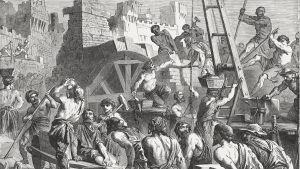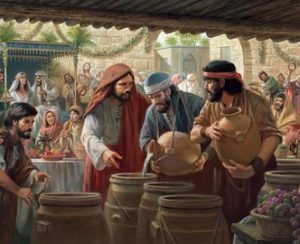John 3.3 – 3.10
Brian Welch: From Korn to Jesus
Christianity is personal, it goes to the heart of the individual and it changes lives. You can be a clever person, a rich person, socially successful or down and out but if Christianity doesn’t personally impact you in your inner core as a person it is of no lasting value to you. Why is that? It is because Christianity is about personally being born spiritually and from that beginning one’s life changes and a relationship with God starts. Nicodemus knew all about religious practices as a Pharisee and teacher of the law. He was faithfully obedient to all the customs and rituals. He knew the scriptures inside out. However, that does not equal spiritual life. His religion was at that time an empty husk except for one thing he had desire in his heart to know more about Jesus and he recognized that Jesus was from God. ‘For no one could perform signs you are doing if God were not with him.’ John 3.2
That desire to know more about Jesus and really wanting to change is God’s Spirit speaking into our mind. Being as it were touched by the Spirit of God is described by Jesus as, ‘The wind blows wherever it pleases. You hear it’s sound, but you cannot tell where it comes from or where it is going.’ Johm 3.8 It is poetic language but everybody who has started a relationship with God will recognize that prompting that draws us closer to Jesus. We look back and say I have known the Spirit convicting me even when I have fought against him. Jesus concluded his description of the Spirit’s impact by saying, ‘So it is with everyone born of the Spirit.’ John 3.8 Jesus longs for each one of us to respond to the Holy Spirit’s prompting and ask him to be spiritually born.
Is spiritual birth a real thing and is it absolutely necessary? Jesus makes clear that spiritual birth is necessary for forgiveness, spiritual life and eternal life. He says it twice to Nicodemus. ‘Very truly, I tell you, no one can see the kingdom of God unless they are born again.’ John 3.3 ‘Very truly I tell you, no one can enter the kingdom of God unless they are born of water and the Spirit.’ John 3.5
This to Nicodemus was a whole new idea and so naturally enough he gets confused about the difference between natural birth and spiritual birth. ‘ “How can someone be born when they are old?” Nicodemus asked.’ Jesus states plainly that spiritual birth is separate to natural birth because they are different. ‘Flesh gives birth to flesh, but the Spirit (notice the capital S indicating that it is the Holy Spirit) gives birth to spirit.’ John 3.6 God alone can give one spiritual life we cannot do it for ourselves. Our role is to ask and trust.
Why did Jesus say that one needed to be born of water and the Spirit? The idea that the Spirit gives spiritual birth is straight forward but what is meant by being born of water. Jesus was speaking to a learned Jewish leader who would have known the scriptures intimately. He therefore refers Nicodemus back to Ezekiel’s prophecy addressed to the nation of Israel when the people had persistently pursued sinful ways. ‘I will sprinkle clean water on you, and you will be clean; I will cleanse you from all your impurities and from all your idols.I will give you a new heart and put a new spirit in you; I will remove from you your heart of stone and give you a heart of flesh. And I will put my Spirit in you and move you to follow my decrees and be careful to keep my laws.’ Ezekiel 36.25-27 The sprinkling with water symbolizes forgiveness and cleansing from their old ways that rejected God. The Spirit within enables one to live a life pleasing to God.
Is it time to take the step that Nicodemus eventually did and ask Jesus for spiritual birth, to be cleansed from old ways and received the Spirit’s life and have a new start?
If one took that step some time ago but now need one’s spiritual life to be refreshed then do not hesitate to come again to Jesus, ask for forgiveness and cleansing, to be filled again with his Spirit to overcome sin and lead a life that is fulfilling and righteous.
Newsboys – Born Again




